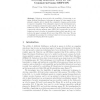Free Online Productivity Tools
i2Speak
i2Symbol
i2OCR
iTex2Img
iWeb2Print
iWeb2Shot
i2Type
iPdf2Split
iPdf2Merge
i2Bopomofo
i2Arabic
i2Style
i2Image
i2PDF
iLatex2Rtf
Sci2ools
125
click to vote
EVOW
2010
Springer
2010
Springer
Evolving Behaviour Trees for the Commercial Game DEFCON
Abstract. Behaviour trees provide the possibility of improving on existing Artificial Intelligence techniques in games by being simple to implement, scalable, able to handle the complexity of games, and modular to improve reusability. This ultimately improves the development process for designing automated game players. We cover here the use of behaviour trees to design and develop an AI-controlled player for the commercial real-time strategy game DEFCON. In particular, we evolved behaviour trees to develop a competitive player which was able to outperform the game’s original AI-bot more than 50% of the time. We aim to highlight the potential for evolving behaviour trees as a practical approach to developing AI-bots in games.
Artificial Intelligence | Artificial Intelligence Techniques | Behaviour Trees | EVOW 2010 | Strategy Game Defcon |
| Added | 18 May 2010 |
| Updated | 18 May 2010 |
| Type | Conference |
| Year | 2010 |
| Where | EVOW |
| Authors | Chong-U Lim, Robin Baumgarten, Simon Colton |
Comments (0)

